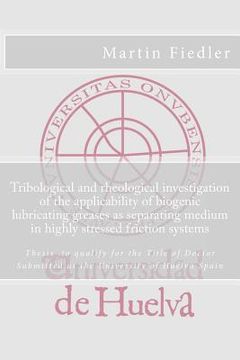Compartir
Tribological and rheological investigation of the applicability of biogenic lubricating greases as separating medium in highly stressed friction syste (en Inglés)
Martin Fiedler
(Autor)
·
Createspace Independent Publishing Platform
· Tapa Blanda
Tribological and rheological investigation of the applicability of biogenic lubricating greases as separating medium in highly stressed friction syste (en Inglés) - Fiedler, Martin
$ 16.480
$ 27.460
Ahorras: $ 10.980
Elige la lista en la que quieres agregar tu producto o crea una nueva lista
✓ Producto agregado correctamente a la lista de deseos.
Ir a Mis Listas
Origen: Estados Unidos
(Costos de importación incluídos en el precio)
Se enviará desde nuestra bodega entre el
Miércoles 29 de Mayo y el
Lunes 10 de Junio.
Lo recibirás en cualquier lugar de Chile entre 1 y 3 días hábiles luego del envío.
Reseña del libro "Tribological and rheological investigation of the applicability of biogenic lubricating greases as separating medium in highly stressed friction syste (en Inglés)"
There is a growing demand of environmentally friendly lubricating greases that presently can only be satisfied partially. The purpose of this work is to fundamentally investigate the effects that grease components exert on the resulting rheological and tribological characteristics. A limited number of different components-that is four different base oils and four structurally different thickener systems-were selected, which qualify these greases as bio-lubricants. All sixteen greases were formulated at identical NLGI grades to eliminate the consistency's influence on the results. These greases then underwent a series of tribological experiments on a nano tribometer test rig with the application of four different normal forces and two different material combinations resulting in individual sets of Hertzian stresses. Additionally, atomic force microscopy observations of all model greases were carried out to give evidence to their micro structural setup. The model greases were also rheologically investigated under different deformation situations. On the one hand, the flow response in transient shear was monitored in rotational tests, on the other hand, the greases were rheologically characterized by both, the frequency and amplitude dependent responses in small-amplitude oscillatory shear. All thus found results were also evaluated from an energetic pointof view. In addition, a series of rather unconventional test were performed with the model greases. These were tensile tests with a plate-plate rheometer where a defined gap was filled with grease and then subjected to a separation of the plates while logging the normal force and bouncing ball tests where a steel ball hit a grease-covered steel plate after having fallen a preset distance. In latter tests the resulting bouncing hight, the length of the drawn grease string as well as the impact mark were investigated. The main findings of this work are based on influences that the different base oil polarities exerted on the tribological as well as the rheological grease characteristics. For one thing, they were revealed in the type, severity and extent of wear marks produced in the contacting surfaces of tribological tests. Here it was shown that these base oil polarity influences highly depend on the applied thickener system and the investigated material combination. It has even shown that polarity influences can be also significantly dampened depending on the material combination. For another thing, polarity influences were detected in the outcome of the rheological grease investigation. Here it was shown that the extend with which they come to act highly depends on the employed thickener system. It has also shown that the base oil polarity influenced the percentage thickener share depending on the type of thickener system. In the transient shear flow tests an attempt has been made to eliminate the rheological results from this thickener percentage. This is done by the evaluation of the activation energy, necessary for the structural thickener degradation revealing a large difference between greases based on highly polar oils and those based on low-polarity oils. It is shown that this effect also highly depends on the applied thickener type. This work is concluded by a disquisition of effects that help to elucidate the working mechanisms in the lubricated grease contact and which evoke individual wear results in all grease systems and material combinations. One of these effects pertains to the mechanisms that come to act with different base oil polarities and the direct influence they exert on wear results. The other effect highlights the mechanisms that come to act in the internal grease structure which has been elucidated by rheometric assessment. It is also shown that these two effects influence each other.
- 0% (0)
- 0% (0)
- 0% (0)
- 0% (0)
- 0% (0)
Todos los libros de nuestro catálogo son Originales.
El libro está escrito en Inglés.
La encuadernación de esta edición es Tapa Blanda.
✓ Producto agregado correctamente al carro, Ir a Pagar.

